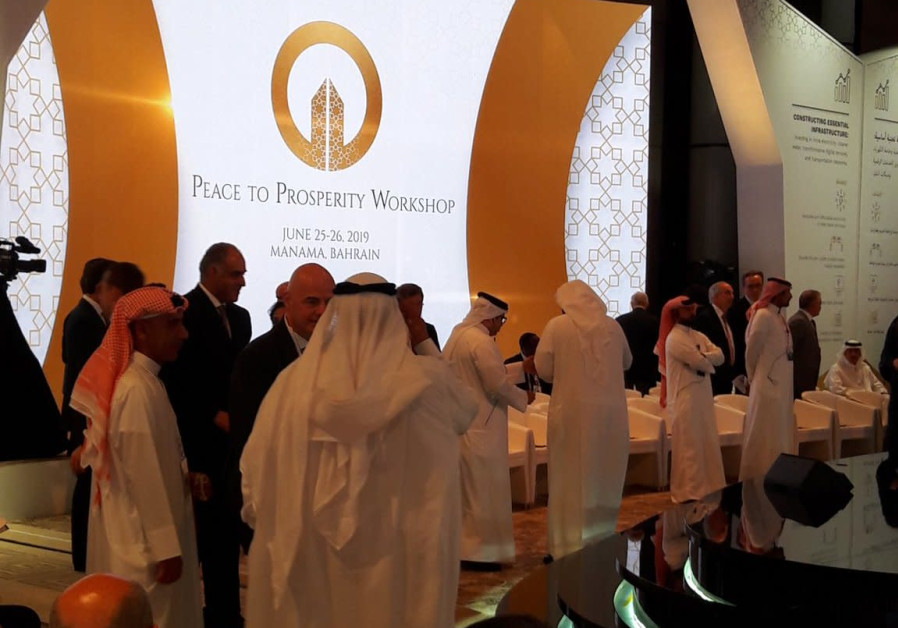Kushner in Bahrain: Economic prosperity is pathway to Mideast peace

US-led conference in Bahrain. (photo credit: HERB KEINON)
MANAMA, Bahrain – Peace in the Middle East can only be achieved if it comes with a pathway for people to improve their lives, US President Donald Trump’s top adviser Jared Kushner said in Bahrain on Tuesday, in explaining why his team is rolling out the economic chapter of their Mideast peace vision before the political one.
“One who is more hopeful and sees an opportunity for his or her family will put energy into pursuing opportunity, instead of blaming others for their current misfortune,” Kushner said. “That is why agreeing on an economic pathway forward is a necessary precondition to what has previously been an unsolvable political situation.”
Addressing a few hundred government and business officials from around the world gathered in the ballroom of the luxurious Four Seasons Hotel – including the Arab world – Kushner said that for “too long the Palestinians were trapped in an ineffective framework of the past.”
He said the Peace to Prosperity framework that the administration released on Saturday and which is the focus of the current workshop, “is a modern framework for a prosperous future, a vision of what is possible with peace.”
A new way forward is necessary, he said, because “while politicians pay lip service, the world moves forward and the Palestinians continue to be left behind.”
Well aware of the criticism his plan has come under for leading with the economic aspects of a peace vision rather than defining the political plan, Kushner said “Economic growth and prosperity for the Palestinian people is not possible without a political solution to the conflict, one that guarantees Israeli security and respects the dignity of the Palestinian people.”
But, he added, “Today is not about the political issues. We’ll get to those at the right time.”
The goal of the workshop, he said, is to begin thinking about the challenges in a new way to try to view the conflict and the entire region through a different lens.
“Some people have mockingly called this effort the ‘Deal of the Century,’ but at its core it is not just about making a deal. In fact, it is better referred to as the opportunity of the century, if leadership has the courage to pursue it. This is about creating opportunity for the Palestinian people, about creating opportunity for people throughout the Middle East.”
Trump and America, he said to the Palestinians, “have not given up on you. This workshop is for you.”
After Kushner’s presentation, which included an overview of the $50 billion blueprint, Stephen Schwarzman, chairman of Blackstone – the world’s largest private equity investment firm – and Mohammed Alabbar, an Emirati businessman and founder of Emaar Properties, one of the world’s leading real estate development firms, took center stage and addressed the issue of the Palestinian boycott of the workshop.
“One would have hoped that the beneficiaries of the dream would have been here,” said Schwarzman. “This has been 72 years of complexity, and things don’t change overnight. To make change you need a vision.”
Alabbar said that in a way, he was representing the Palestinians.
“The issue of the Palestinians is very close to our hearts, he said, “Every one of us is Palestinian at heart, because their issue is our issue. Unfortunately, they are not here. It would be amazing to have them here. But if I feel I represent them, it is my story, Palestine and its people. It is close to my heart. So we represent them.”
Among those at the gathering were the Bahraini crown prince and the country’s foreign minister, finance ministers from Saudi Arabia and Qatar, International Monetary Fund chief Christine Lagarde, World Bank president David Malpass, US Treasury Secretary Steven Mnuchin, and former British prime minister Tony Blair.
Join Jerusalem Post Premium Plus now for just $5 and upgrade your experience with an ads-free website and exclusive content. Click here>>






Comments are closed.